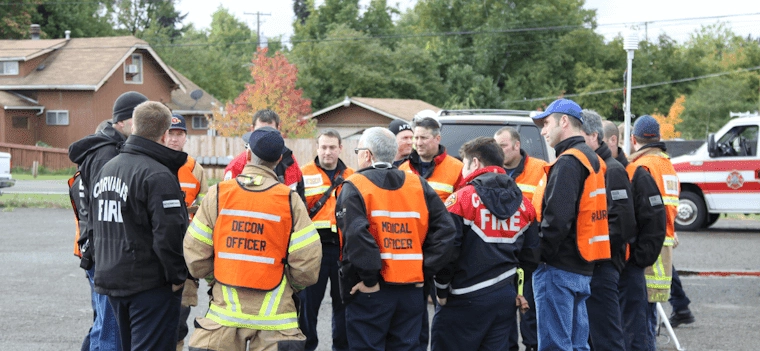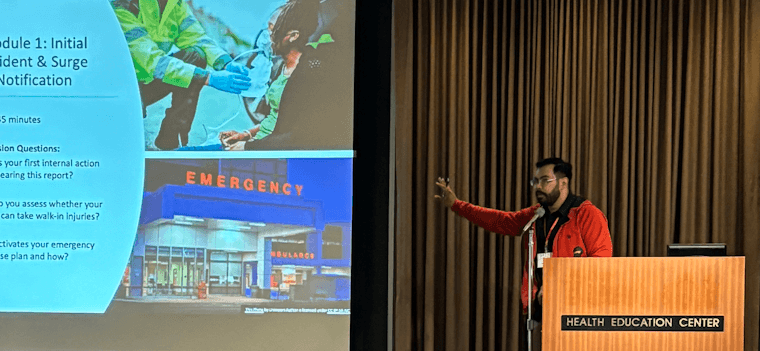Emergency Preparedness

Helping Clinics & Communities Prepare, Respond, and Recover
Disasters and emergencies—from extreme weather to public health crises—can disrupt healthcare access and put you and your communities at risk.
CCHC helps health clinics prepare for, respond to, and recover from emergencies.
We offer clinics in HPO Region 1 emergency preparedness resources, training, coordination, and technical assistance. We collaborate with over 24 health clinics and other partners in six Oregon counties, including:
- Non-hospital health providers, including: CCHC member clinics, general practice clinics, pediatric clinics, surgery centers, dialysis centers, rural health care clinics, and the community groups that they serve.
- Culturally specific community-based organizations–to ensure that preparedness, response, and recovery efforts reflect the needs and voices of those most impacted.
Not a Region 1 Clinic but still want emergency preparedness resources and training for your community group or organization? View our emergency preparedness resources.
Region 1 Clinic Emergency Preparedness
Hospitals are likely to be overloaded quickly in an emergency. Our goal is to build resilient clinics that ensure the patients and communities they serve are supported before, during, and after a crisis.
We help clinics prepare for a range of emergencies like:
- Natural hazards and disasters
- Biochemical terrorism
- Active shooters
- Cybersecurity incidents
We pay particular attention to helping clinics support vulnerable populations who are often overlooked in emergency preparedness efforts.
Ensure Your Clinic is Ready & Resilient
Explore the support we offer to the clinics we work with:
- Always Stay Connected
If your non-hospital clinic is in HPO Region 1, here are important ways to stay connected and involved:
- Attend Quarterly Convenings
We’ll share best practices, lessons learned, and hands-on support to help you craft, strengthen, and implement your emergency plans. Some of our past trainings have included:- Active shooter preparedness, response, and recovery
- Mental Health First Aid
- Cascadia Earthquake Preparedness
- Cybersecurity and Healthcare Vulnerabilities
- Continuity of Care training and assistance
Get Critical Updates
Receive regular emergency preparedness updates from CCHC as well as critical, up-to-the-minute information during an emergency or extreme weather.Join the NW HPO Clinic Subcommittee Workgroup
Collaborate with fellow clinics and emergency preparedness leaders across our region to strengthen our collective crisis response. Stay connected, share best practices, and remain fully integrated into broader regional emergency planning and response efforts.
You can get connected to these opportunities by emailing .(JavaScript must be enabled to view this email address) or calling 503-546-4991.
- Attend Quarterly Convenings
- Before an Emergency: Stay Ready
CCHC helps clinics proactively build and maintain emergency preparedness programs.
Ways CCHC Can Help Your Clinic- Build your plan
Get one-on-one support to develop, update, and implement your clinic’s emergency response plan. We’ll help you meet CMS Emergency Preparedness Rule requirements. - Train your team
We offer workshops, summits, and hands-on drills to help staff respond to a variety of emergencies with confidence. - Stay alert
We’ll send you relevant weather briefings and emergency notifications relevant to your clinic and region. Region 1 clinics can follow CCHC on Facebook or subscribe to receive our emails by emailing .(JavaScript must be enabled to view this email address) or calling 503-546-4991. - Stay connected to key resources
We’ll help you stay connected to critical information from key partners like:- Oregon Department of Emergency Management
- Regional Disaster Preparedness Organization
- Northwest Oregon Health Preparedness Organization
- Multnomah County Office of Emergency Management
- Portland Bureau of Emergency Management
- Ready.gov
- Medline Plus
- Cybersecurity & Infrastructure Security Agency
- National Weather Service
- Ready Northwest
- Build your plan
- During an Emergency: Get Support
When disaster strikes, CCHC serves as a liaison between Region 1 clinics and emergency management agencies, helping clinics access critical supplies, information, and coordination.
Ways CCHC Can Help Your Clinic
- Stay informed
We’ll support you with current updates on emergencies or weather events with steps to take in advance to be ready for what’s coming. - Request resources
We can help connect you to medical supplies, PPE, logistical support, and other resources by coordinating with other local emergency management agencies like Oregon Department of Emergency Management and NWHPO. - Receive critical updates
We’ll keep you updated on how the crisis is affecting healthcare operations in the region. - Be represented
We communicate clinic needs and on-the-ground response updates back to local, regional, and federal emergency management partners.
- Stay informed
- After an Emergency: Recover & Strengthen
Recovering from a disaster is just as important as preparing for one. CCHC helps clinics reflect, rebuild, and strengthen their emergency plans for the future.
Ways CCHC Can Help Your Clinic
- Get recovery support
We’ll guide your clinic through accessing recovery resources and funding from local and state agencies. - Debrief and learn
After key events, meet one-on-one or in group sessions with CCHC technical experts for an after-action review to assess your response and review what worked and what didn’t. These sessions help you find ways to respond fairly and effectively to the needs of all communities—especially those most impacted. - Strengthen your plan
Use insights from the emergency to revise and improve your clinic’s preparedness plan with the support of our technical expert.
- Get recovery support
PULSE 2025 Emergency Preparedness Summit

In May 2025, CCHC convened outpatient facilities, healthcare clinics, ambulatory surgery centers, and non-hospital partners to learn about emergency preparedness and strengthen our region’s response strategies.
As the designated emergency preparedness hub for Region 1, CCHC designed a summit focused on providing opportunities for:
- Hands-on scenario planning
- Relationship building across entities and geographies
- Policy updates
- Collaborative workshops rooted in equity and community resilience
Attendees gained critical tools to prepare for infrastructure disruptions and support vulnerable populations during crises.
PULSE 2025 reaffirmed the importance of cross-sector partnerships and the unique role community clinics play on the front lines of emergency response.
Who We Work With
We partner with local, regional, and state agencies to ensure that clinics and the communities they serve have the support they need.
Our Funders
- Urban Areas Security Initiative (UASI)
- Regional Disaster Preparedness Organization (RDPO)
- Oregon Health Authority’s Northwest Oregon Health Preparedness Organization
- Multnomah County Health Department
